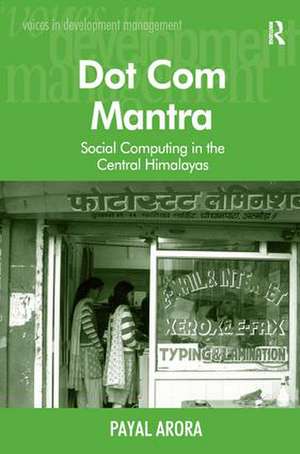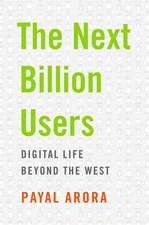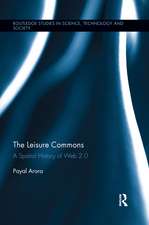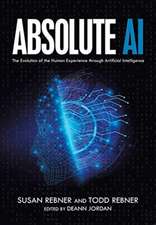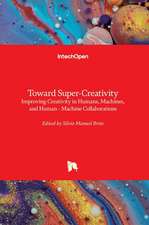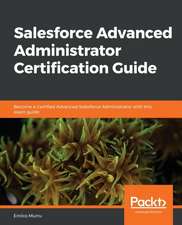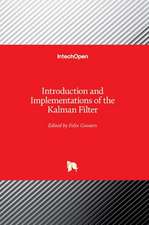Dot Com Mantra: Social Computing in the Central Himalayas
Autor Payal Aroraen Limba Engleză Hardback – 28 sep 2010
| Toate formatele și edițiile | Preț | Express |
|---|---|---|
| Paperback (1) | 489.26 lei 6-8 săpt. | |
| Taylor & Francis – 23 noi 2016 | 489.26 lei 6-8 săpt. | |
| Hardback (1) | 1057.09 lei 6-8 săpt. | |
| Taylor & Francis – 28 sep 2010 | 1057.09 lei 6-8 săpt. |
Preț: 1057.09 lei
Preț vechi: 1289.13 lei
-18% Nou
Puncte Express: 1586
Preț estimativ în valută:
202.26€ • 211.21$ • 167.03£
202.26€ • 211.21$ • 167.03£
Carte tipărită la comandă
Livrare economică 15-29 aprilie
Preluare comenzi: 021 569.72.76
Specificații
ISBN-13: 9781409401070
ISBN-10: 1409401073
Pagini: 206
Dimensiuni: 156 x 234 x 13 mm
Greutate: 0.52 kg
Ediția:1
Editura: Taylor & Francis
Colecția Routledge
Locul publicării:Oxford, United Kingdom
ISBN-10: 1409401073
Pagini: 206
Dimensiuni: 156 x 234 x 13 mm
Greutate: 0.52 kg
Ediția:1
Editura: Taylor & Francis
Colecția Routledge
Locul publicării:Oxford, United Kingdom
Notă biografică
Payal Arora is Assistant Professor in International Media and Communication in the Department of Media and Communication at Erasmus University Rotterdam, The Netherlands.
Recenzii
'A towering piece of research and writing, imbued with theoretical and methodological vigor, and sensitively illuminating the intersections of digital media and human ingenuity in the Central Himalayas. A must read.' Arvind Singhal, University of Texas at El Paso, USA, and Clinton School of Public Service, USA 'In every age, innovative technology has been met with an awkward mixture of enthusiasm, indifference, scepticism and hostility. The advent in our time of cheap, mobile computing and cellular telephones has drawn a similar response, especially in the international development community. In Dot Com Mantra, Payal Arora goes beyond the familiar juxtapositions to show how poor individuals and communities actively negotiate their engagement with twenty-first century technology, documenting the conditions under which they use, abuse and reject it in their everyday lives. The result is a book that is fascinating in its own right, but also highly instructive to a new generation of development policymakers, in rich and poor countries alike, caught between an imperative for easy answers and the reality of messy complexity.' Michael Woolcock, World Bank 'Dot Com Mantra is an excellent work by Payal Arora. ... [it] focuses largely on the social, economic, and political aspect of development considered within a global framework. Dr. Arora speaks the language of the area and fully immersed herself in its day-to-day life, moving among farmers' organization, development groups (non-governmental organizations-NGOs), teachers and students, and even volunteering her time working in an Internet café, from all of which she derived deep understandings.' Journal of Education, Community & Values
Cuprins
Chapter 1 Introduction; Chapter 2 Frogs to Princes: Taking the Leap; Almora; Chapter 3 This is India, Madam!; Chapter 4 New Technology, Old Practices; Computers and Rural Development; Chapter 5 Goodbye to the Patwaris; Chapter 6 1A version of this material has been published as an article in the British Journal of Educational Technology. I would like to thank Colin Latchem, the Asia-Pacific Corresponding Editor of BJET for his tireless effort in shaping this article. Also, I would like to thank David Hawkridge for his insightful comments and the anonymous reviewers for their feedback. I am much indebted to Sugata Mitra for challenging and engaging me in this novel and important arena of informal learning; Computing and Cybercafés; Chapter 7 1Some material from this chapter has been used to produce a case study for educational technology and learning. This case study has been published in S. Marshall and W. Kinuthia (eds) (2010), Cases n places: Global cases in educational and performance technology. Charlotte, NC: Information Age Publishing; Chapter 8 Let’s Go Shopping!; Chapter 9 Leisure, Labor, Learning; Chapter 10 Conclusion;
Descriere
This ethnographic study of social computing in the Central Himalayas, India, investigates alternative social practices with new technologies and media amongst a population that is largely undocumented. The book offers fresh, critical perspectives on issues of free learning with computers, the range and role of actors as intermediaries of digital information, impact of direct versus indirect access on social computing, gender and technology and transnational consumption and production of knowledge.
